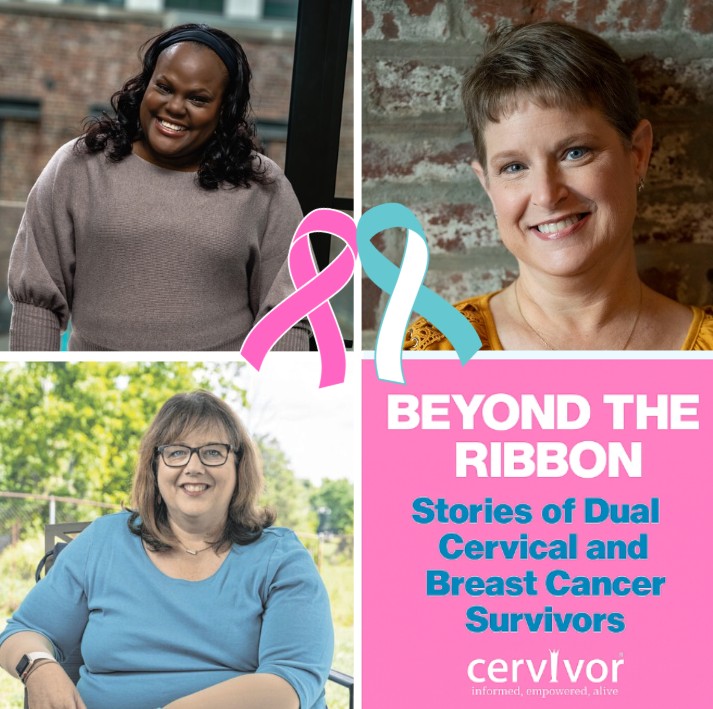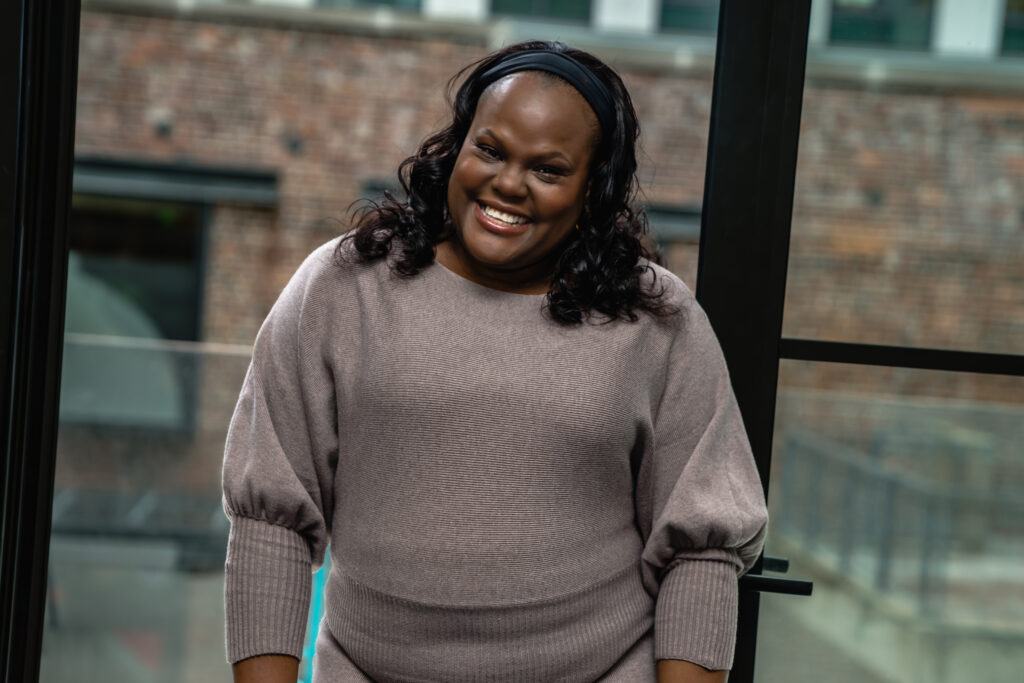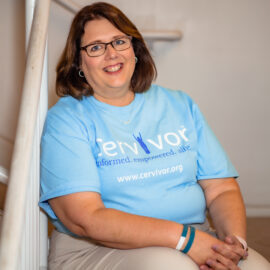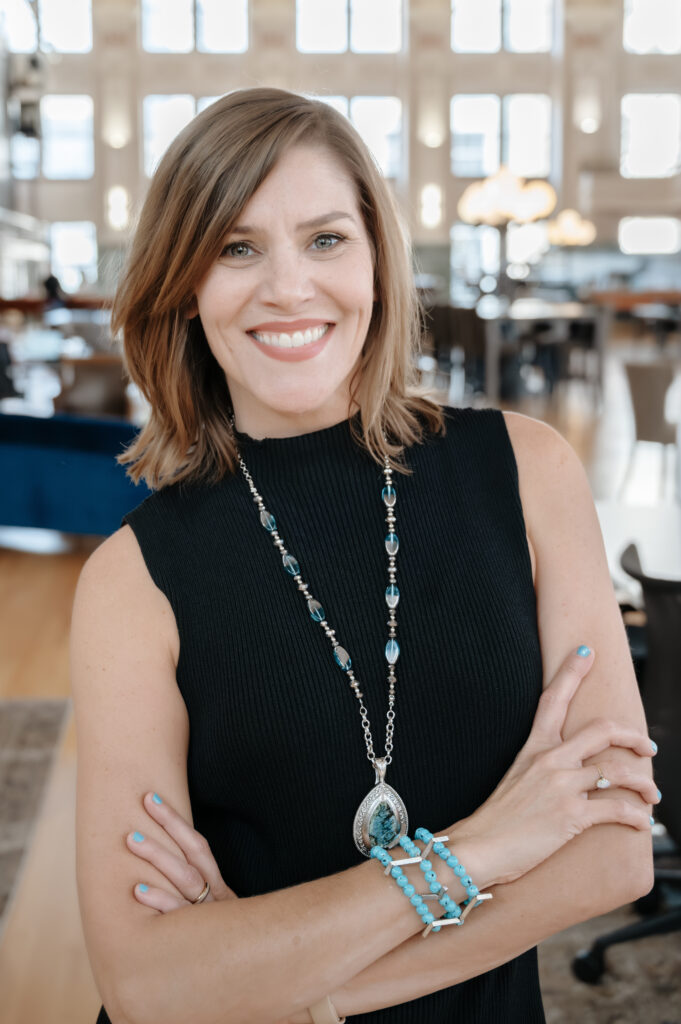By Sara Lyle-Ingersoll, Cervivor Communications Director

October’s pink wave for Breast Cancer Awareness Month (BCAM) has swept in, and January’s teal and white for Cervical Cancer Awareness Month (CCAM) will be here soon enough—both sharing life-saving knowledge about two unnecessarily deadly diseases. These awareness months, colors, and causes matter. But at Cervivor, we hold to a core truth: Cancer doesn’t care about ribbons, and neither should survivorship. We’ve all heard the gut-punch words, “You have cancer,” faced the fear, and endured the fight.
Rather than keeping awareness siloed, let’s use this moment to embrace solidarity—especially among women affected by breast, cervical, and other gynecologic cancers. Cervivor recently wrapped up Gynecologic Cancer Awareness Month (GCAM), packed with programming to highlight our shared stories and strengthen the collective community.
This unity is practical, too. Early detection and equitable care save lives. Learn the key facts about breast, cervical, and other gynecologic cancers, and be inspired by dual survivor stories that bring the statistics to life.
Breast and Below-the-Belt Cancers in 2025: Key Facts and the Importance of Screening Programs
- Breast cancer is the most common cancer among U.S. women, with about 316,950 new invasive cases in women and 2,800 in men expected in 2025, plus about 59,080 DCIS cases. Roughly 1 in 8 women (13.1 percent) face a lifetime diagnosis, and 1 in 43 (2.3 percent) a risk of death. Tragically, about 42,170 women and 510 men are expected to die this year.
- Cervical cancer, though less common and preventable through HPV vaccination and regular screening, remains devastating. About 13,360 new invasive cases and 4,320 deaths are projected in 2025, with an incidence of 7.7 per 100,000 women and a mortality of 2.2 per 100,000. Underserved communities are hit hardest due to access barriers.
- Other gynecologic cancers—including ovarian, uterine, vaginal, and vulvar cancers—add over 110,000 new cases annually. Across all these diagnoses, early intervention is key.
To address these disparities, the National Breast and Cervical Cancer Early Detection Program (NBCCEDP) has been providing free or low-cost mammograms and Pap tests to underserved women across all 50 states, D.C., and U.S. territories since 1991. The program has helped detect thousands of cases early, contributing to a 43 percent drop in breast cancer mortality since 1989 and a 75 percent decline in cervical cancer rates since Pap tests became widespread.
Despite these successes, challenges like rural access gaps, cultural stigma, and other barriers remain—making programs like NBCCEDP even more vital for ensuring equity in cancer prevention and care. As funding debates continue, now is the time to urge policymakers to prioritize consistent support for these lifesaving screening programs. Contact your state and federal representatives today.
Voices in the Fight: Stories of Shared Dual Breast and Cervical Cancer Survivorship
Below are three voices from the Cervivor community—all dual cervical and breast cancer survivors—who embody solidarity across ribbon lines:



Kadiana Vegee
“My journey has shaped me, but it hasn’t broken me,” shares Cervivor Ambassador Kadiana Vegee, who has spoken candidly on CervivorTV. Diagnosed with stage III cervical cancer and later testing positive for the BRCA1 mutation, she underwent a preventative double mastectomy. Her story bridges cervical and breast cancer advocacy, and she continues to champion screening, HPV awareness, and genetic testing—especially in underserved communities.
Karen North
A nurse by training and a long-time Cervivor Ambassador and Cervivor Pride leader, Karen was first diagnosed with breast cancer, then 18 months later received a cervical cancer diagnosis. Her lived intersection fuels her advocacy: She often shares both journeys in Cervivor forums, events, and blog posts.
Laura Lemons
Laura, a 2019 Cervivor School graduate, speaks powerfully about stigma and interconnected cancer awareness. Her voice is one of resilience across the divisions of “above-belt” and “below-belt” cancers, sharing, “We cannot stop talking about breast and cervical cancer… We are the warriors, the survivors, and the thrivers.”
Together, the words and experiences of these Cervivor community members—and their powerful dual cancer survivor stories—highlight the common thread that unites us.
Support the Solidarity: Double Your Impact Today
This Breast Cancer Awareness Month, let’s blur those ribbon lines. If you’re moved to donate to breast cancer causes, we ask you to match it with a gift to Cervivor—helping us eliminate cervical cancer through education, advocacy, and community.
Your support powers prevention and early detection education, amplifies survivor stories like those shared here, and stands in solidarity with every cancer patient—past, present, and future. Donate now and be the link in our chain of solidarity. Because no ribbon should stand alone.
About the Author

SARA LYLE-INGERSOLL is a seasoned content and communications expert dedicated to transforming lived experiences into impactful stories. Her award-winning magazine feature about a close friend who passed from cervical cancer in their twenties led her to connect with Cervivor’s founder, Tamika Felder, and solidified her commitment to cervical cancer awareness and prevention. Now, as Cervivor’s Communications Director, Sara brings this mission full circle. Her previous roles include Editor-in-Chief of The Finder in Singapore, Deputy Editor at Woman’s Day, Lifestyle Director at Good Housekeeping, and Senior Editor at Jane Magazine. Based in Denver, she is a boy mom of a blended family and enjoys good food, travel, and all the sunsets.
